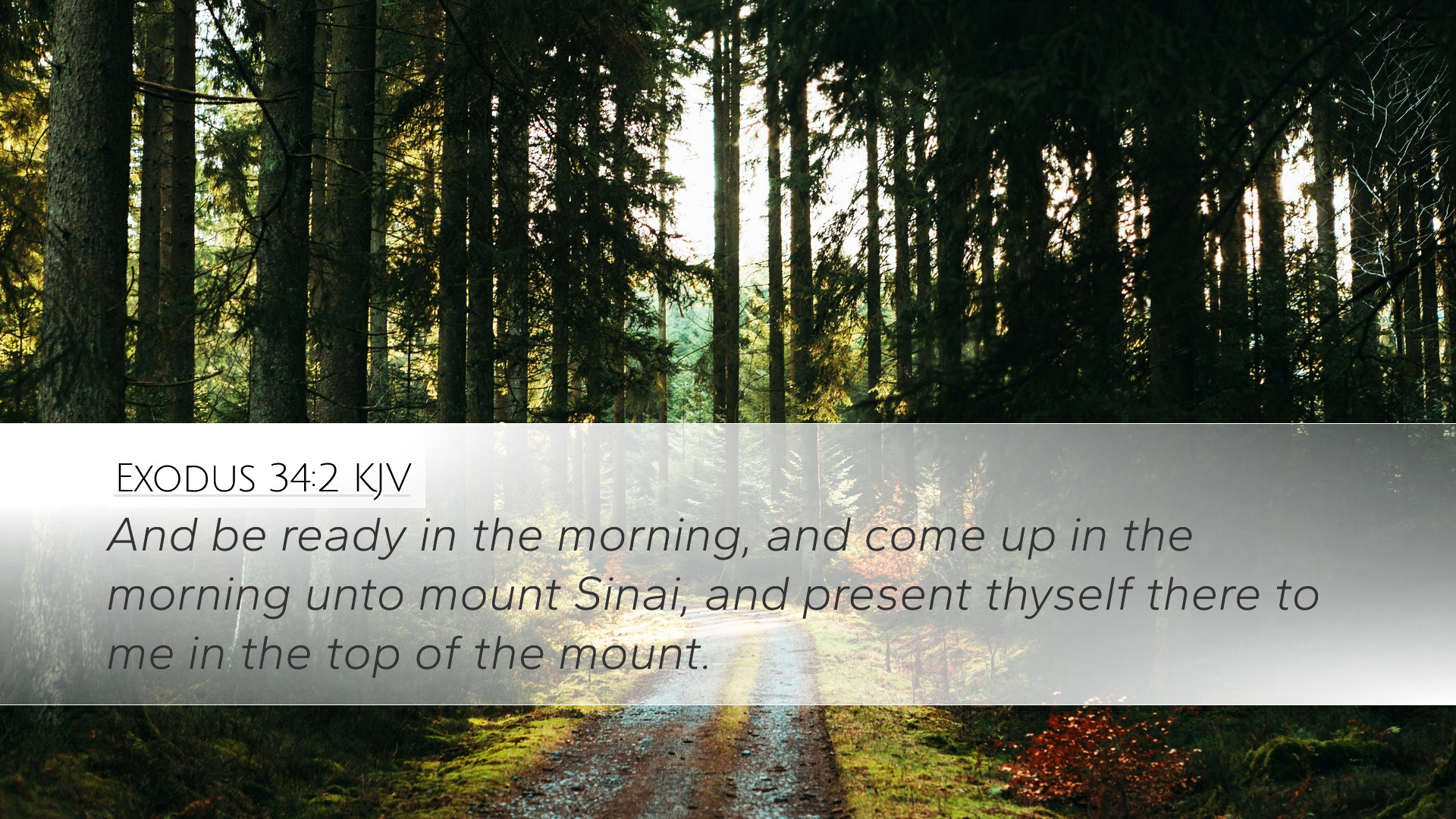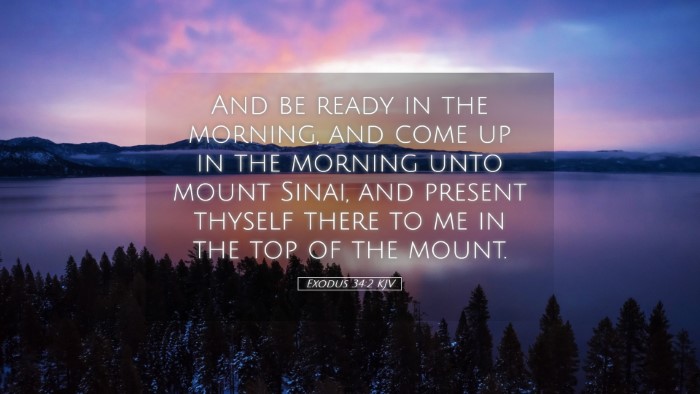Commentary on Exodus 34:2
Exodus 34:2 states, "And be ready in the morning, and come up in the morning unto mount Sinai, and present thyself there to me in the top of the mount." This verse plays a significant role in understanding both the historical context of Israel's covenant relationship with God and the nature of divine revelation.
Contextual Background
The verse follows a tumultuous period for the Israelites, marking a crucial point after the incident of the Golden Calf, where they turned away from the One True God. Moses, acting as the mediator between God and His people, is called to ascend Mount Sinai to receive the renewed commandments.
This moment emphasizes God's mercy and the desire for reconciliation with a wayward people. The specific mention of Moses preparing in the morning indicates readiness and devotion, themes often echoed throughout scripture.
Insights from Public Domain Commentaries
Matthew Henry's Commentary
Henry highlights that the command to "be ready in the morning" symbolizes the importance of preparation before approaching God. He emphasizes that spiritual readiness is crucial for engaging with God's holiness. Moses is to ascend the mountain to receive the tables of stone, which represent the covenant. It signifies a new beginning and the reiteration of God’s laws after the people's sin.
- Spiritual Preparation: Henry stresses the reason behind morning preparation, reflecting a state of mind conducive to receiving divine wisdom.
- Covenant Renewal: The renewal of the covenant is a major theme in this passage, indicating God's willingness to forgive and restore.
Albert Barnes' Notes
Barnes notes that the command carries significant implications regarding the nature of God’s relationship with Israel. The emphasis on "present thyself" indicates a personal and direct interaction with God. He points out that the top of the mountain symbolizes a place of revelation, where God's glory and law can be fully understood.
- Personal Divine Encounter: The directive to present oneself highlights the relational aspect of worship and obedience to God.
- The Role of Mountains in Scripture: Mountains are often associated with divine encounters. This illustrates God's transcendent nature yet His intimate engagement with humanity.
Adam Clarke's Commentary
Clarke provides a detailed examination of the phrase "come up in the morning." He notes that this speaks to the discipline required in the pursuit of holiness and knowledge of God. Clarke suggests that the early morning is symbolic of seeking God with the first fruits of one’s day, which is a principle echoed throughout Scripture.
- Indication of Prioritization: Clarke points out that seeking God first exemplifies a life set on spiritual matters, reflecting devotion and focus.
- Symbol of New Beginnings: The morning light represents fresh opportunities for relationship, learning, and re-commitment to God’s laws.
Theological Implications
The call to ascend Mount Sinai reflects core theological themes: divine transcendence, covenantal faithfulness, and the necessity of human readiness to receive revelation. Each element of the command serves to illuminate the profound nature of God's holiness and the appropriate approach needed by humanity when seeking divine communion.
- Divine Transcendence: God's instruction for Moses to ascend the mountain illustrates His otherness and the sacred space that must be respected.
- Covenant Faithfulness: The renewal aspect shows that even after sin, God remains faithful and desires a relationship with His people.
- Human Responsibility: The emphasis on being ready signifies human responsibility in the relationship, underscoring the importance of preparation through prayer and righteousness.
Practical Application
For pastors, students, theologians, and Bible scholars, this verse serves as a reminder of the continuous need for preparation and expectation in the pursuit of knowing God through His word. The call to "be ready" involves cultivating consistent spiritual disciplines, such as prayer, scripture study, and community accountability.
As believers, it beckons us not just to be passive recipients of God’s grace but an active participant in the covenant relationship through intentionality in our spiritual walk. It evokes the challenge of assessing our level of readiness each day and our response to God's ongoing call for deeper intimacy and revelation.
Conclusion
Exodus 34:2 encapsulates a vital moment in the narrative of the Israelite's relationship with God, illustrating themes of preparation, divine revelation, and covenant renewal. As we reflect on this passage, may we be inspired to present ourselves before God with sincerity, intentionality, and a readiness to receive His commandments.


